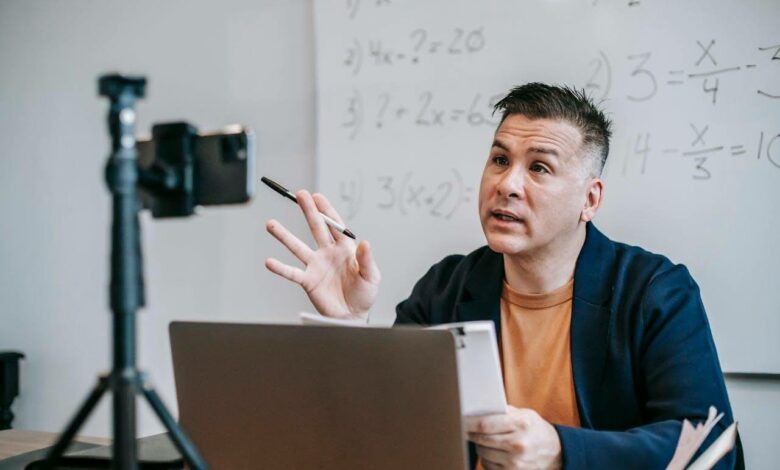Here’s Why Lifelong Learning Is Essential for Educators

The concept of lifelong learning is often associated with students, but it’s equally vital for educators themselves. As professionals entrusted with shaping minds, teachers’ ability to adapt and grow directly impacts their effectiveness and the success of their students. This commitment to continual learning isn’t just about staying current; it’s about enriching the educational experience and ensuring that teaching methods stay relevant and impactful. Whether it’s through pursuing higher degrees, attending workshops, or simply engaging with the latest educational research, the benefits of this ongoing educational journey reach far beyond the classroom.
In this blog, we will explore the numerous reasons why lifelong learning is indispensable for educators, from enhancing teaching quality to maintaining personal fulfillment and professional competitiveness.
The Ever-Evolving Field of Education
Education is dynamic, constantly influenced by new research, technological advancements, and societal shifts. Educators face the challenge of keeping up-to-date with these changes to remain effective. Lifelong learning enables teachers to adopt innovative teaching strategies that reflect the latest educational trends and theories. This continual adaptation not only enhances their teaching but also prepares students for a world that values flexibility and knowledge.
Increased Demand for Diverse Skills
Today’s educators are expected to manage a classroom that is more diverse than ever before. From integrating technology into the curriculum to addressing varied learning styles, the skills required of modern teachers extend far beyond traditional pedagogy. Engaging in ongoing professional development helps educators build these diverse skills, which are critical in fostering an inclusive and dynamic learning environment.
Adding to Professional Credentials
Continuing education is a powerful tool for educators looking to advance their careers. Pursuing an online specialist degree in education, for example, allows teachers to gain in-depth knowledge in specific areas such as literacy, special education, or educational leadership. This specialization can lead to higher positions within the educational sector, such as curriculum developer or administrative roles, offering a pathway to greater impact and personal career satisfaction.
The Impact on Teaching Quality
Engaging in lifelong learning has a direct impact on the quality of teaching. Educators who consistently refine their teaching strategies and learn new methods are better equipped to deliver engaging and effective lessons. The knowledge gained from advanced studies and ongoing training translates into enhanced educational outcomes for students, making the pursuit of continued education a worthwhile investment for any teacher.
Staying Updated with Technological Advances
With the integration of technology in education showing no signs of slowing down, staying updated is crucial for educators. Lifelong learning courses often include training on the latest educational technologies, from virtual classrooms to student assessment tools. By mastering these technologies, teachers can offer students a more engaging and interactive learning experience, preparing them for a digital future.
Networking Opportunities
Professional development courses and programs provide more than just educational benefits; they also offer valuable networking opportunities. Teachers can connect with peers, share insights, and collaborate on projects through these educational forums. These connections can lead to partnerships and innovations in teaching that benefit the wider educational community.
Meeting the Needs of All Learners
Modern classrooms are diverse, with students coming from varied backgrounds and possessing different learning abilities. Lifelong learning helps educators understand and implement educational practices that cater to this diversity. Regular professional development can introduce teachers to new strategies for differentiated instruction, allowing them to effectively support each student’s unique learning path. Such knowledge ensures that every student, regardless of their starting point, receives the education they deserve.
Fostering a Love of Learning in Students
Teachers who actively pursue their own learning journeys serve as powerful role models for their students. This commitment to education shows students the value of curiosity and continual improvement. By sharing their own experiences with learning, teachers can inspire their students to seek knowledge and challenge themselves throughout their lives. A classroom culture centered on growth and curiosity prepares students for lifelong success.
Adapting to Educational Policy Changes
Staying informed about educational policies is vital for teachers. Lifelong learning includes understanding and adapting to these changes, which can often alter curriculum requirements or assessment methods. By participating in ongoing education, teachers can adjust their methods swiftly and comply with new standards, ensuring they provide their students with current and relevant instruction. This adaptability also allows them to lead by example, showing students the importance of flexibility and preparedness for change. Teachers can use these policy changes as teachable moments, integrating them into lessons that help students understand the broader context of their education.
Read also What You Need to Know about Motorcycle Shipping?
Personal Fulfillment and Growth
For many educators, the pursuit of knowledge is not just a professional requirement but a source of personal satisfaction. Lifelong learning enables teachers to explore subjects of interest deeply, contributing to their sense of fulfillment and well-being. This personal growth often translates into a more passionate and engaging teaching style, benefiting students and teachers alike. It also fosters resilience, allowing educators to navigate the stresses of the profession with a stronger sense of purpose. These ongoing learning experiences can open new career opportunities, making the field of education an exciting place for personal and professional evolution.
Encouraging Reflective Practice
Reflective practice is a key component of professional development, allowing teachers to assess their own teaching and make necessary adjustments. Lifelong learning encourages this kind of reflection, providing educators with the tools to critically analyze their teaching methods and student responses. This ongoing self-assessment is essential for continuous improvement and effective teaching. Moreover, it helps educators stay emotionally and intellectually engaged in their roles, preventing burnout. The practice of reflection also promotes a deeper connection with students, as teachers continuously tailor their approaches to better meet individual needs.
The Ripple Effect on the Educational Community
When educators commit to lifelong learning, the benefits extend beyond individual classrooms. This commitment can inspire entire schools and districts to prioritize professional development, creating a culture of education that values continuous improvement. As more educators adopt this approach, the entire educational community becomes more dynamic, knowledgeable, and effective. Such an environment attracts quality professionals and enthusiastic students, enhancing the reputation and effectiveness of the institution. It also fosters a collaborative atmosphere where ideas and innovations can flourish, further enriching the educational landscape.
Conclusion
Lifelong learning equips educators with the tools they need to meet the ever-changing demands of their profession. By continually updating their skills and knowledge, teachers can maintain their effectiveness in the classroom, inspire their students, and contribute positively to the broader educational community. This commitment to personal and professional growth not only enriches their own lives but also enhances the learning experiences of their students, ensuring that education remains dynamic and relevant in a rapidly evolving world.





